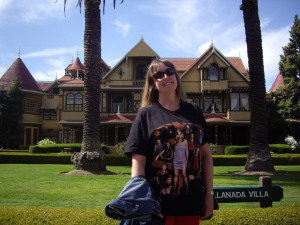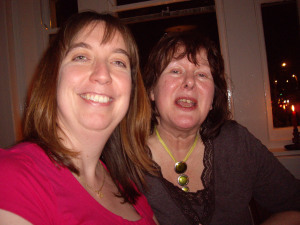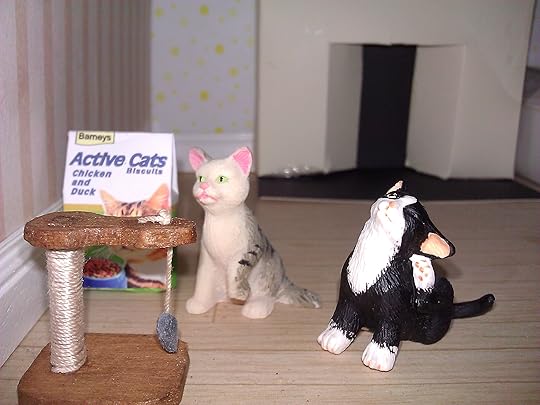Sara Jayne Townsend's Blog, page 25
October 23, 2013
Con Conundrums
(Cross-posted on the WriteClub blog)
It has come about that my last two Cons of 2013 fall on consecutive weekends. This weekend I’m at BristolCon, and next weekend is World Fantasy Con in Brighton. At BristolCon I am a participant – two panels and a book signing – and at World Fantasy Con I am merely a delegate.
The usual Con conundrums apply. The first is – what to pack? For Bristol this is more crucial, since I will be performing the role of ‘author’, instead of just watching other people do it. So what outfit says ’serious writer’ without saying ‘I’m mad as a box of frogs and you don’t want to come anywhere near me.’ Sometimes the Con involves a formal dinner that obviously involves having to pack an outfit for it. Sometimes I worry I try too hard with this issue of Con clothing. Jeans and a t-shirt is probably an acceptable Con outfit for a writer. It might be appropriate for my ‘horror writer’ t-shirt to get another airing this weekend.
Mode of transportation is also relevant to the first question. If I’m driving to a Con, I can take more stuff. But this generally only happens if I can take the day I am travelling off work. On neither forthcoming Con I have been able to do that – which means it’s easier to take the train from London than travel home, pick up the car, load it up and set off again. But taking the train directly after work means I have to take all my luggage into London, which is another factor to consider. Whatever I take has to be transported on a packed commuter train, and sit in the office until I leave.
On Friday I have to be at work for a meeting, so I will be leaving as soon as possible after that’s finished. It does mean that the smart ‘work clothes’ that will be required for that will have to be my travelling clothes to Bristol. Unless I take a change of clothing.
When travelling to a Con, the issue of having space for books also must be considered. It is impossible to leave a Con without having acquired books. Many of them give out freebies in the delegate bags, and there’s a pretty good chance you’ll buy some, too. For BristolCon, I am also taking some copies of SOUL SCREAMS for the author signing session. But I am really hoping that I will sell at least a couple of them, otherwise I have to cart them all back home with me.
I am looking forward to both Cons, and they will both be very different experiences. Hopefully they will both give me something to blog about for the next two weeks, too.
And once I’ve had a chance to catch my breath, it will be time to plan 2014′s Con schedule…


October 21, 2013
Season of Suicides and Leaves on the Line
There’s no question that Autumn has arrived in the UK. It’s dark now when I leave the house in the morning, and dark when I arrive home in the evening. The heating is on, the duvet is back on the bed, I’ve dug out the long waterproof coat, and I’ve started wearing tights with my work skirts.
Transportation problems also seem to increase at this time of year. Leaf fall and excessive rain make tracks slippery and cause delayed trains. Signalling problems seem more abundant when the weather is bad. And people are more likely to throw themselves under trains.
The most common reason for delayed commuter trains is someone being hit by one. I know that I should feel sorry for the poor sods who feel the need to end it all under a packed commuter train, but it happens far too often, and inconveniences far too many people, for me to empathise much these days. I do feel sorry for the poor train drivers, however. If you’re driving the train that reduces a human being to goo on the tracks, even if they deliberately put themselves there, you’re not likely to forget it.
This morning I had a particularly troublesome journey into work. There are two lines from our local station, into two different London stations. One line was running no trains due to a fatality further down the line, the other was running delayed trains because of engineering works over-running from the weekend. But the advantage of the London suburbs is there is always another route. I walked to another station and took the Thameslink train, which is another route altogether. That was actually not a bad journey – 35 minutes on the train, and I was able to get off at a station that was only a 15-minute walk from the office. If it wasn’t for the 30-minute walk from home to the station where I have to get this train, it might be a viable option for my daily commute.
But, I did get to work in the end, and thankfully all the train problems seemed to have been sorted by the time I made my journey home.
Despite my dislike of Autumn and Winter, I was an Autumn baby – my birthday is later this week. I have been told that I was born in the early hours of the morning, during a horrendous thunderstorm. You’d think that would make me more amenable to Autumn weather, but no.
When I was a kid I quite liked having an October birthday. My birthday always fell during half term week, which meant I never had to go to school on my birthday and I could have my party on the actual day. Kids’ birthday parties are always during the day, so the short days never meant much then.
As an adult, though, it’s a different story. It’s often difficult to find people to celebrate with on the day because it’s usually cold and windy and pissing down with rain and people are less inclined to go out. Or they are sick, since this time of year is the start of the winter flu season. One year I was sick myself on my birthday. Determined to drag myself in to work because I didn’t want to spend my birthday sick, I felt so dreadful I ended up going home early, and spent the rest of the day alone on the sofa feeling rubbish.
But we can’t do anything about changing our date of birth. Only the Queen gets to have an ‘officlal’ birthday, at an agreeable time of the year, as well as her actual one. So I will be venturing out on Thursday, whatever the weather (and according to the forecast it’s likely to be pissing down with rain) to celebrate the anniversary of my entry into the world. As long as there is wine at the restaurant – and somebody there to help me drink it – I shall have a good time regardless.
I’m still counting the days until summer, though.


October 16, 2013
The Winchester Mystery House
(Cross-posted on the WriteClub blog)
I’ve been wanting to go to the Winchester Mystery House for nearly 30 years – ever since I saw it featured on TV. It was on either “That’s Incredible” or “Ripley’s Believe it or not”, I can’t remember which – both featured the bizarre and the strange, and were on TV in the early 1980s when I lived in Canada.

Winchester Mystery House, from front left, and gardens
Somehow we never got there on our previous two trips to San Francisco. I was very glad that on our third and recent trip there, we were able to hire a car and get to San Jose to pay a visit to this fascinating house.
Chances are, you’ve heard of this place already. It’s the house built by Sarah Winchester, heir to the Winchester rifle fortune. Sarah and her husband had only one child, Annie, who died of a rare childhood disease when she was six weeks old. A few years after that, Sarah’s husband died of tuberculosis. Some say she was driven mad with grief, and never got over the death of her baby. Whatever the case, Sarah got it into her head that she was cursed by the vengeful spirits of all of those who had been killed by the Winchester rifles her husband’s family had produced, and the only way to break the curse was to buy an unfinished house and keep on building.
She moved from her home in Connecticut and bought an unfinished eight-room farmhouse in California. She hired servants, gardeners, and a crew of carpenters, who kept building. In fact they didn’t stop. These carpenters worked in shifts, and the work carried on continuously, 24 hours a day, seven days a week, until Sarah’s death 38 years later.
It’s a bizarre house. It has 160 rooms and 40 bedrooms. There are stairs that go nowhere, doors that open onto blank walls, other doors that lead to two-storey drops, secret passages, rooms with no floors, windows that look out onto brick walls. Sarah Winchester designed most of the house herself. Some say she built the house the way she did to confuse the spirits. I think she was likely suffering from paranoid schizophrenia – she thought spirits were speaking to her, and the servants were conspiring against her. But she was also stupidly rich, and therefore it didn’t matter how mad she was, people would do what she said. Apparently she paid all her staff twice the going rate, but she paid them daily in cash, so that if she had the whim to fire anyone, she could do so on the spot. Arguing with her about her illogical building plans was apparently a cause for instant dismissal.

Me standing at the front of the house – note lack of symmetry…
Sarah WInchester was obsessed with the number 13, which is a recurring motif throughout the house. Windows have 13 panes of glass. Ceilings have 13 panels. There is even a chandelier with 13 light fittings. Apparently it originally came with 12, but Sarah wasn’t having that and she added the thirteenth herself – and you can tell which one she added, because it’s wonky and obviously stuck on.
Naturally there are many stories about the Winchester house being haunted. It does have a decidedly creepy appearance. With so much building work the house is not symmetrical, and viewing it from the outside it looks odd. Inside, there are so many rooms many of them don’t have any windows or natural light, so it is rather dark and dim. But we saw it on an exceptionally hot and sunny day – positively balmy for the time of year – and it was full of tourists, so it didn’t seem particularly creepy. Then again, I have no psychic sensitivities whatsoever. I’d like to remain open minded about the existence of ghosts, but if there are any, I’m unlikely to ever see any. I don’t get easily creeped out. So saying, I rather wish we could have gone at Hallowe’en, when they do a ‘ghost tour’ by torch light. The place might be a whole lot creepier then.
I did feel rather sorry for Sarah Winchester. She lived alone in this house apart from her staff, and apparently never had visitors – the rest of the family thought she was nuts and stayed away. So she rattled around alone in this immense house, working her way around the 40 bedrooms – never sleeping in the same room more than one night in a row, allegedly to confuse the spirits she was convinced were out to get her.

Outside view of ‘door to nowhere’ – leads to 15-foot drop
You are not allowed to take pictures inside the Winchester Mystery House, and any that are on the internet are copyright and not able to be used without permission. Which I don’t have. So I can only include here pictures of the outside. But a Google search of the Winchester Mystery House will take you to plenty of websites that do include images of some of the bizarre features of the house.
If you are ever in the San Jose area of California, do visit the Winchester Mystery House if you can. It’s a fascinating tour. And is the house really full of vengeful ghosts, or was Sarah Winchester as mad as a box of frogs? Well, you’ll have to make up your own mind about that.


October 11, 2013
Farewell to Dot Lumley
I was saddened this week to learn that literary agent Dot Lumley had lost her battle with cancer. I met Dot on several occasions over the years, and she was a lovely lady, who always had time for writers, be they new or more established ones.
Dot handled many genres of fiction incuding both crime and horror. I submitted both SUFFER THE CHILDREN and DEATH SCENE to her. She rejected both, but with personal letters and encouraging words that convinced me she had taken the time to read them through, instead of going down the form rejection route.
Our paths crossed at a variety of conventions – since she dealt with all genres she attended both the crime and the horror/SF/fantasy Cons. At the St Hilda’s Crime Conference in August 2009, I found myself sitting next to her at dinner on the Saturday night. The contract for SUFFER THE CHILDREN from Lyrical Press had come to me days before, and I was still trying to decide whether or not to accept it. I knew that Lyrical Press was an e-book only publisher, and by accepting the contract I was likely to forfeit the opportunity to ever see SUFFER THE CHILDREN in print. I took the opportunity to ask Dot for her advice. She told me that if this was a manuscript that was doing the rounds for a while (it had been), and if the e-book contract was for a finite length of time (it was), then I had nothing to lose and I should go for it. When I returned home at the end of the weekend, I took Dot’s advice and sent an email accepting the contract.

Me and Dot Lumley, January 2011
The last time I saw Dot was in January 2011. The T Party Writers’ Group hold a Winter Social in the early months of the year, where we get together for food, drink and chat. In the last few years we have taken to inviting guests – authors, agents and editors who have come to speak to the group or got involved with us in some other way. Or sometimes just because we like them. Dot was attending our social event as a guest that year, and I spent a good part of the evening chatting to her. In fact, at one point it was just her and me sitting in a corner on our own. Then my husband started chatting to one of our other guests, Mike Carey – it turns out they have a shared interest in building model kits – and a few minutes later I realised that the rest of the group were pulling chairs up to join us at the table, and we had been hogging the special guests.
This picture was taken on that evening. Much wine had flowed by that point.
When I heard about Dot’s death I felt compelled to pay homage to her in a blog post. I had to look back at previous posts to avoid repeating myself, as I was sure I had told at least one of these stories on this blog before, but it turns out that I hadn’t. Sometimes I think about posting things and then don’t, for whatever reason. I think in this case I wrote a post about our social event and the famous guests I had been schmoozing with, and was worried it would come across as nothing more than blatant name-dropping so I deleted it. I also had a reluctance to share this photo, which I considered somewhat unflattering at the time.
But now Dot is gone, and this is the only picture I have of the two of us together – a record of the last conversation I will ever have with her. Once again I am reminded of how brief and fragile life is. Now I want to share this photo with the world, and it no longer seems unflattering, because in it we are both alive and well, and smiling.
Dot was an exceptional lady and the publishing world is all the poorer now she has left it. Jo Fletcher has written a very touching blog post paying tribute to Dot’s courage, and I encourage you to go read it. It’s far more eloquent than what I have written here.
Many literary figures have left us of late – James Herbert, Iain Banks and Ann Crispin are names that immediately spring to mind. Dot Lumley was not as famous as these other names, but she touched many lives in the publishing world, including mine. Her absence will be noticed.
Goodbye, Dot. I shall miss running into you at conventions, but I hope you have found peace.


October 9, 2013
BristolCon 2013
(Cross-posted on the WriteClub blog)
This year will see my first attendance at BristolCon, a one-day convention organised by the Bristol Fantasy & SF Society, in its fifth year.
This year’s event takes place on 26 October, and now that the programme has been officially released I am pleased to be able to announce my programme items. I am going to be quite busy for this one.
I am kicking off at 10:00 am with a panel on innovative deaths. Lots of scope there for interesting discussion, I am sure. Between now and then I shall be trying to come up with new and gruesome ways of killing people. All in the name of research, of course.
At 2:00 pm there will be a mass signing for all authors present, and an opportunity to sell books, and I will be pitching up there with copies of SOUL SCREAMS. I’ll also be happy to sign anything that contains one of my stories, and I’m putting this out as a challenge to try and find who’s got the oldest publication. Has anyone out there got an old copy of PEEPING TOM with my story in? Or, to go even further back, the October 1989 issue of FEAR? If anyone brings me one of these to sign I’ll give them a free copy of one of my books.
At 4:00 pm I am moderating my first panel – on the pros and cons of small press publishing. I am really excited about this, as I think it’s a perfect topic for me to be moderating, and there are lots of discussion points on this subject to put to the panel.
There are many other fabulous items on the very full programme, and if you are able to get to Bristol for the day do consider coming along – there aren’t too many Cons that you can do in their entirety in a day, and the membership for this one is a mere £20. A bargain for the price.
Britain’s most established genre Cons are BFS FantasyCon and EasterCon, but it’s reassuring to see a rise in the number of smaller Cons that start out as small local gatherings and gradually get bigger every year. The UK may be too small to compete with the US for the number of Cons, but there’s no doubt that the number of SF/Fantasy/Horror fans in this country is on the rise. And where fans gather, Cons will happen. The only down side is there are now so many fantastic Cons, I have to decide each year which ones I’m going to do. I have neither the leave allocation nor the finances to do all of them. I wish I could.
If you make it to BristolCon, do seek me out – it would be great to see you (if nothing else, as a reassurance that people do actually read this blog). In the meantime however, I must dash. I’ve got to go and think up some intelligent questions to ask my panel.


September 22, 2013
Dolls’ House Update: Cats and Sofas
Work on the dolls’ house project has been slow of late. Lack of time continues to be an issue, but my own crapness also plays a role. Working on the dolls’ house requires craft skills. You need patience, manual dexterity and skills in analytical planning. I seem to possess none of these traits.
The house is now erected and mostly decorated, and my lack of skill is apparent. There are air bulges in the wallpaper. The floors sag, and I have no idea why, or how to fix them. None of the corners align properly, and the thing just generally looks lopsided.
I continue to attend monthly meetings of my dolls’ house club – though admittedly I tend to make less than half of them every year. I was hoping to pick up tips. However, everyone else there seems to be so much better at this sort of stuff than I am, and the kind of tips I need are so basic that it never seems to occur to anyone that I might not know how to do this sort of stuff. I guess it’s kind of like joining a football team – there will be an assumption that anyone wanting to join the team already knows how to play the game, and I come in not even knowing you’re supposed to kick the ball.
However, in spite of the house not being finished yet I have been collecting various bits of furniture over the years. Yesterday my dolls’ house club went on an excursion to the Miniatura show in Birmingham. We’ve done this before, and it always feels a bit like a school field trip. We all meet at the allocated meeting point at 8:30am, armed with packed lunches. We board the mini-bus and go off on a jolly trip to the show, and at the end of the day we are dropped off again, tired and happy.
The Miniatura show is full of wondrous things. Most of the vendors are dolls’ house enthusiasts who enjoy making tiny accessories and selling them on – everything you could possibly want for your house you can generally find there, from scaled-down tins of beans and chocolate bars to actual working dolls’ house sized television sets. Every period is catered for. Most people seem to prefer their dolls’ house to be nostalgic – Victorian or Tudor period, say. Mine is contemporary. Contemporary accessories can be found, but are not as popular. Generally my experience has been if you browse a show and see something you like, buy it then and there because you never know when you’ll see it again. On this latest trip to Miniatura I found a black leather sofa and matching armchairs that I thought would look perfect in my house. So I bought them.

Dolls’ house living room, with furniture to date
I have set them up in my dolls’ house living room, along with the flat screen TV I bought at a previous show. The furniture is looking pretty good, but the room itself is not yet finished. If you look closely at the top right-hand corner of the picture you will see one of my mistakes. When I put up the coving on the ceiling, I sawed the wood straight across and glued it in place, before realising that I should have cut it at an angle, in order to fit the coving along the back panel that makes up the back wall of the house. And then I couldn’t take it off without pulling off all the wall and ceiling paper, and that took a long time to affix. It’s the sort of mistake I typically make in this project because I really have no idea what I’m doing, and I’m still not sure how I’m going to fix it.
This picture also features the sole occupant of the dolls’ house. Thus far I have not found any other figures to complete this household. I haven’t found any child dolls in modern dress I like yet, and the male dolls just never seem to look right – somehow they all come out looking like women with short hair. I am considering making my house an all-female household.
Thus far, this lone woman doll occupies the house with two cats, complete with kitty accessories, and these are pictured below. The scratching post and the bag of kitty kibble I found at the Miniatura fair and I thought they were so cute. It might be hard to tell from the picture, but everything is 1/12th scale – so an inch represents a foot. I am particularly impressed with the scratching post.
 So my dolly household contains a lady with two cats – which some might say is just perfect as it is, even if the house acquires no further occupants. I already have a set of bunk beds, though, and quite a lot of dolls’ house size toys and games, so could do with a couple of child dolls.
So my dolly household contains a lady with two cats – which some might say is just perfect as it is, even if the house acquires no further occupants. I already have a set of bunk beds, though, and quite a lot of dolls’ house size toys and games, so could do with a couple of child dolls.
1/12th scale is the traditional dolls’ house scale, but 1/24th and 1/48th scale dolls’ house furniture are becoming increasingly popular – I think this is mostly due to the fact that they take up less space. I am really not fond of these smaller scales – that’s just too tiny for my liking, especially when it’s me that has to fiddle around placing the accessories. A steady hand I do not have.
I fear the finished house is going to look just a bit ramshackle, and I’m not really enjoying the actual building, since I’m so crap at it. The furniture and accessories, however – that’s the fun part.


September 11, 2013
The Lost Art of Letter Writing
(Cross-posted on the WriteClub blog)
When we first moved to Canada from England in 1980, I was ten years old. There was no email, in those days. The World Wide Web was not available to all. In order to stay in touch with all the people I’d left behind, I’d started writing letters. There were a lot of people I wanted to stay in contact with. School friends. Aunts, uncles and cousins. Grandparents. My father and step-mother, who were still back in England.
Most people wrote back. I would look forward to getting home from school and checking the mail, to see if any letters had arrived for me. I made a point of replying to every one. I became very good at writing letters, and the process became a ritual. I kept every letter I received in a letter rack, stacked in order of receipt with the oldest in front. When I sat down to write a reply, I would reply to the person whose letter I’d had the longest. If the person had asked any questions in their letter, I would make a point of replying to them, whether it was something generic like “how is school?”, or as specific as, “how did that play go you were rehearsing for last time?” I would also write about any news that had occurred since last time I wrote to the person.
My letters were long, generally running to at least six pages, sometimes more. A lot of people gave me stationery sets when we moved to Canada. Generally they contained a number of decorated front sheets, the same number of envelopes, and half as many continuation sheets. I never understood this, because it wasn’t enough. I used up all the continuation sheets within two or three letters and then either had to use more than one of the front sheets, or carry on with pieces of ordinary lined notepaper. I always wondered why there were never more continuation sheets than front sheets. How could anyone possibly have so little to say they could do it in a letter only a page long?
Somewhere in the last 20 years, the art of letter writing has been lost. I admit I don’t write letters any more. Many of the people I used to write letters to are now on Facebook, so I keep up with their news that way. Pretty much all of them are on email, and I will occasionally send people newsy emails.
I write emails the way I write letters – in fact, the way I write anything. Sentences are complete, with all the punctuation in the correct place. They tend to be very long. Sometimes I miss writing letters, but it occurs to me that writing this blog is, for me, the modern equivalent of writing letters. I can relay my news via the World Wide Web, and I don’t have to repeat myself – something of an advantage over letter writing, I must admit, as in my letter-writing heyday I was repeating the same news in every letter.
Nobody writes letters anymore, and not many people write long emails, either. I can’t decide if this is down to laziness, to the fact that life has just got so busy, or that people’s attention span has got shorter in the last 20 years. We are used to being fed instantaneous information, in short bursts – Tweets; texts; 30 second commercials. Now nobody wants to be bothered to read to the end of a lengthy email. A lot of people seem to write emails the way they write text messages – devoid of grammatical structure, and full of crass abbreviations (“u” instead of “you”) and erroneous spellings.
Most people do not communicate via lengthy emails. Some people communicate entirely by mobile phone. I have always been a person who prefers written communication to verbal. There are very few people I have long telephone conversations with. If I’ve not seen you in a while and I want to chat, I am more likely to send you a long chatty email than I am to pick up the phone. But, I am a writer. Written communication is and always has been my strength.
Sometimes I mourn the lost art of letter writing. I sometimes regret we can’t go back to those long-gone days when I used to look forward to getting home and reading a letter that had arrived in the post for me.
I also mourn the correct use of English. I don’t know if grammar has been removed from the school curriculum these days – the appalling state of some people’s Facebook statuses makes me suspect it has been – but certainly letter writing has been.
It may be that people have no need to write letters any more, but kids should still be taught how to form a sentence. Effective written communication, even by email, is an essential life skill. What chance have you got of getting the job if the cover email that accompanies your CV is written in text-speak? If I received a job application like this I would delete the email without even bothering to look at the CV. If I get an advertising brochure from anyone featuring a misplaced apostrophe in the word “its”, I will make a point of avoiding whatever product it is advertising. There is no excuse for poor grammar, and no excuse for not knowing how to form a correct sentence.
If we were all taught how to write letters, we’d all be aware of that.


September 9, 2013
Monday’s Friend: Lyndi Alexander
I am pleased to welcome Lyndi Alexander to the blog today, talking about the themes in her newly released YA post-apocalyptic novel.
THEMES IN APOCALYPSE
By Lyndi Alexander
Several summers ago, I gave in to the hype and read Cormac McCarthy’s The Road. I knew it depicted a post-apocalyptic world before I read it, so I was prepared for some darkness. I just didn’t expect that future to be so black. Same with The Hunger Games. Children killing other children for the entertainment of those not required to participate is pretty grim.
Merriam Webster defines an apocalypse as “a great disaster : a sudden and very bad event that causes much fear, loss, or destruction.”
So, an event. One (perhaps extended) moment in time that changes life from that point on for a number of people.
But even in light of the significance of such an event, the outcome doesn’t have to be a pessimistic one, does it? Each of us as human being has a choice when faced with events—we can succumb to our negative tendencies, or we can take hold of our swaying reality with both hands and steer into a positive current.
I don’t know a person who hasn’t suffered a loss that hasn’t sucked their own life into a void for a period of time, whether that’s the death of a parent/spouse/child, a divorce, loss of a long-time job, or the outcome of a natural disaster. What shows their character is how they react to this event.
Or as it says in the Chinese proverb that is the epigraph for my latest YA novel, “When the winds of change blow, some people build walls and others build windmills.”
In WINDMILLS, what’s meant as a local terrorist act becomes a global apocalypse as a virus that targets Caucasians spreads to wipe out most of the white population of the United States and the rest of the world. Minorities become majorities. Power shifts. But the important battles don’t take place on the field of war, but in the heart and soul of each individual.
In contrast to Stephen King’s similarly post-apocalyptic THE STAND, this story doesn’t base itself on the traditional religious lines between God and the Devil. Good is personified by young Lin Kwan, who is challenged to bring healing herbs across a lawless Pacific ocean to her scientist father in what’s left of America, with the hope of stopping the mutation of this virus and saving everyone who’s survived. Or Xi San, a former pre-med student who’s lost his whole family and has set himself up as a vigilante, saving people in his neighborhood from the gangs, awaiting his own death. Or Eddie Garrick, just turned 18, a gifted electrogeek who sets off across the country to help get radio communications working again.
Of course there are others with less honorable motives. The assassin Jin Piao, sent from China to kill Kwan and her father before they succeed. Gabriel, a white supremacist, emerged from his bunker to exact revenge on the non-whites who have changed his world. Others determined to live by lootings and murders. They’ve made their choices. But will they triumph?
How about you? If an apocalypse—a terrible event out of your control—came to your life, would you give in to those base urges and run wild, or would you hold tight to those moral teachings that have guided you all your life? Would you build a wall, or a windmill?
She had a few family heirlooms, things her parents hadn’t felt safe carrying with them across the ocean: an abalone-and-pearl hair comb of her mother’s; and her father’s treasures of some old military medals, a handful of Japanese military yen he’d kept from an earlier war, and three gold yuan that predated Communist rule of the People’s Republic. Even to a collector, these personal possessions would hardly bring much in the way of cash. She could think of no way they could possibly raise the money they’d need to make the trip.
Doomed from the start.
Shuai peered shyly around the corner from the bedroom. Even though she wasn’t included in this conversation, she could scarcely avoid overhearing them.
“I can sell my hair,” she whispered.
The thought struck horror into Kwan’s heart. Women of her family had always been encouraged to grow long hair, feeling that even if they didn’t have a lot of money, at least they would have beautiful personal assets.
“No, Shuai,” she said quickly.
The little girl stared at her. “We both could. They could make several wigs for the fancy women. They can afford to pay.”
Kwan’s breath caught in her throat, or was that rising nausea? Her long, thick hair had defined her for years and hadn’t been significantly cut since she was five years old. Boys complimented her on it. Other girls coveted it. She had no parents, no money, old hand-me-down clothing, nothing worthwhile, but others had envied her hair.
It was her one vanity.
Ehaung stood in the doorway, plate trembling in the hands she held clenched on its edges. “Your hair…”
Tears came to Kwan’s eyes. She studied Shuai’s hair, lying free and loose on her back. Maybe twenty-four inches. She knew hers was the same. Their hair was tended and well-cared for. “We could make a thousand yuan, maybe more. But, no, Shuai. I couldn’t ask you to do that.”
“I want to,” the little girl insisted. Her bottom lip stuck out as her eyes glittered with determination. “It will grow back. If my hair can see you safely to the care of my uncle, then why should I not give it?”
Kwan’s throat was full, and she could not speak. Her cousin’s generosity, the support of the entire remainder of her family, amazed and pleased her.
“Mine, too,” Ehuang said, her voice a soft murmur. She set the almond cookies on the table and returned to the kitchen for the teapot.
The scent of the baking cookies had filled the apartment all afternoon; Kwan’s mouth had watered, waiting for them to be served. Now, their festive promise had changed to the taste of dust in her mouth.
Kwan turned to look at Zhong, who sat nodding with approval.
“All great causes require sacrifice, Kwan.”
The pain of anticipating her new shorn look sat on her shoulder for a moment then faded. This was only a means to an end. A small price to pay for what she must do.
For more information about WINDMILLS:
AUTHOR BIO
Lyndi Alexander is by day a lawyer fighting domestic violence, by night a single mother of two special-needs children. She enjoys thinking of “what-ifs” and “what might be” and sharing those musings with her readers. Stop by the Polka Dot Banner book battle and read the first chapter of WINDMILLS for free– http://www.polkadotbanner.com/index.php?option=com_content&view=category&layout=blog&id=93&Itemid=100191


August 29, 2013
Sara Paretsky, Shara Summers and Feminism
(Cross-posted on the WriteClub blog)
I read a great many books – on average, just over one a week. I have read so many books that I find it impossible to pick out just one favourite.
I do, however, have several favourite authors. Authors whose books I constantly go back to, and it feels like visiting an old friend. Books which affect me in such a way I have to choose carefully what I read following them, because everything else will just seem inferior.
One such author is Sara Paretsky. I discovered her V I Warshawski series in the early 1990s, back when I was first aware of enthusiastically embracing feminism. It was a revelation. Here for the first time I encountered a heroine who represented everything I wanted to be. A fiercely independent woman who was brave, resourceful, unafraid to speak her mind and without need of a man to define her existence. Single and childless, V I is sarcastic, blunt and able to hold her own in a fight. I thought then, and still think now, that she is a fantastic role model for young women.
And even in the 21st century, there are few heroines like her. Sue Grafton has a similar independent minded, single and childless heroine in Kinsey Milhone. Kathy Reichs, another writer I admire, has a strong woman in Temperence Brennan, but unlike V I Tempe is a mother, and does occasionally need rescuing by men.
Not everyone shares my adoration of V I, as reviews on Goodreads and Amazon testify. Some readers – among them women, I was surprised to note – find her too unlikeable. They don’t like her sarcasm and confrontational manner.
I do not deny that my amateur sleuth Shara Summers was inspired by V I Warshawski. When I set out to write a crime series, I wanted a heroine like V I – someone courageous and independent minded, who was not afraid to speak her mind. But I wasn’t brave enough to write a police procedural, so I went for an amateur sleuth. And in many ways Shara is very different from V I. She’s not as brave. She’s not the champion of the underdog the way that V I is. And she does occasionally get rescued by men. And because I’m just not as good a writer as Sara Paretsky, sometimes I don’t pull of what I’m trying to do. Maybe Shara just comes across sometimes as being bitchy instead of courageous.
It’s also clear that Shara is not everyone’s cup of tea. DEATH SCENE racked up 31 rejections before it was published by Lyrical Press. One of the most common reasons for the book being rejected was the character not being likeable enough to take through a series.
The revelation that not everyone loves V I Warshawski – because I’ve been enthusiastically recommending these books to everyone for the last 20 years – was a bit of a surprise, and I’ve recently been ruminating on that. V I is sarcastic, snarky, and blunt. She can be downright rude – especially to arrogant and patronising men. In the early books, which seem to be set in the early 1980s, V I is unusual in being a woman P I, and she encounters a hostile reaction to this by many people. Especially men.
Women are not supposed to embody these qualities. Even in these times, they are generally expected to be soft, caring and nurturing, and I think this is the main reason that women who don’t possess these qualities are regarded with suspicion. They are considered to be not ‘normal’ women.
I like the fact that V I is snarky, blunt and rude. But there are some people out there who might say I embody similar qualities. And the same people who wouldn’t like V I for these qualities probably don’t like me much, either.
I must confess that now I’m the wrong side of 40 I’ve got to a point in life where I don’t really care if people don’t like me for being me. As a woman gamer, role-player, and horror writer, I’ve encountered a number of men over the years who don’t know what to make of me. The fact that I’m deliberately childless also causes resentment in certain people – it’s surprising (and depressing) how many people, even in this day and age, who assume that all women want children and any who don’t are instantly labelled as being abnormal and not to be trusted.
None of these things matter that much to me these days, but I’m pretty sure that the people that fall into the aforementioned categories are not my target readership.
For the length of time that human beings have existed on this planet, we’ve proved to be depressingly stagnant in moving on with our thinking. I will go on recommending Sara Paretsky’s books to everyone I have a conversation about crime books with – particularly women. I would like every young women to read at least one V I Warshawski book. For every one who comes away thinking, “this is the sort of woman I want to be,” then a battle will be won.
There’s a long way to go before we win the war, though.


August 21, 2013
Riding the Rejection Train
(Cross-posted on the WriteClub blog)
I am currently in the position of having two completed manuscripts and no publisher. One is a horror novel, the other is the second book in the series about amateur sleuth Shara Summers.
I’ve started submitting these two and I get a strange feeling of deja vu. Between 2007 and 2009 I also had two novels to submit – one horror (SUFFER THE CHILDREN) and one crime (DEATH SCENE), the first Shara Summers book. Then Lyrical accepted SUFFER THE CHILDREN, followed by DEATH SCENE, and the rest is history.
But now I find myself riding the submission/rejection train again, for the first time in quite a while. Though actually I think ‘rejection roundabout’ is a better metaphor. You feel like you’re going round and round in a circle.
I can categorically say it doesn’t get easier. I’ve only just started this journey again, with each novel being sent out to only one publisher so far. Unfortunately it happened that the responses arrived at the same time, in spite one novel being sent out quite a while before the other. The rejection for the crime novel arrived on Monday; the rejection email for the horror novel on Tuesday. So it’s not been a good week.
Before I was published I held this fantastical idea that being published would make it all better. That once I had one novel accepted, everything else I wrote would automatically get accepted, and I would never again worry that what I was writing wasn’t good enough. But that’s not the way it works. Just because someone accepts one novel doesn’t necessarily mean they – or anyone else for that matter – will like everything else you write. And you don’t stop with the writer insecurities. Instead of fearing I’ll never be published, now I fear that the first two novels got published as a bit of a fluke, my creativity is spent and I’ll never write anything of publishable quality again.
But the same rules apply to all writers, no matter how much or how little experience you have. When the rejections come, you have to pick yourself up, dust yourself off and try again. So I’ve crossed the first names off the submission list for these two manuscripts, and getting ready to go down the list.
For the time being, though, I’m still smarting from the double whammy of being rejected twice in two days. I’ll be over here in the corner for a while, quietly whimpering.






